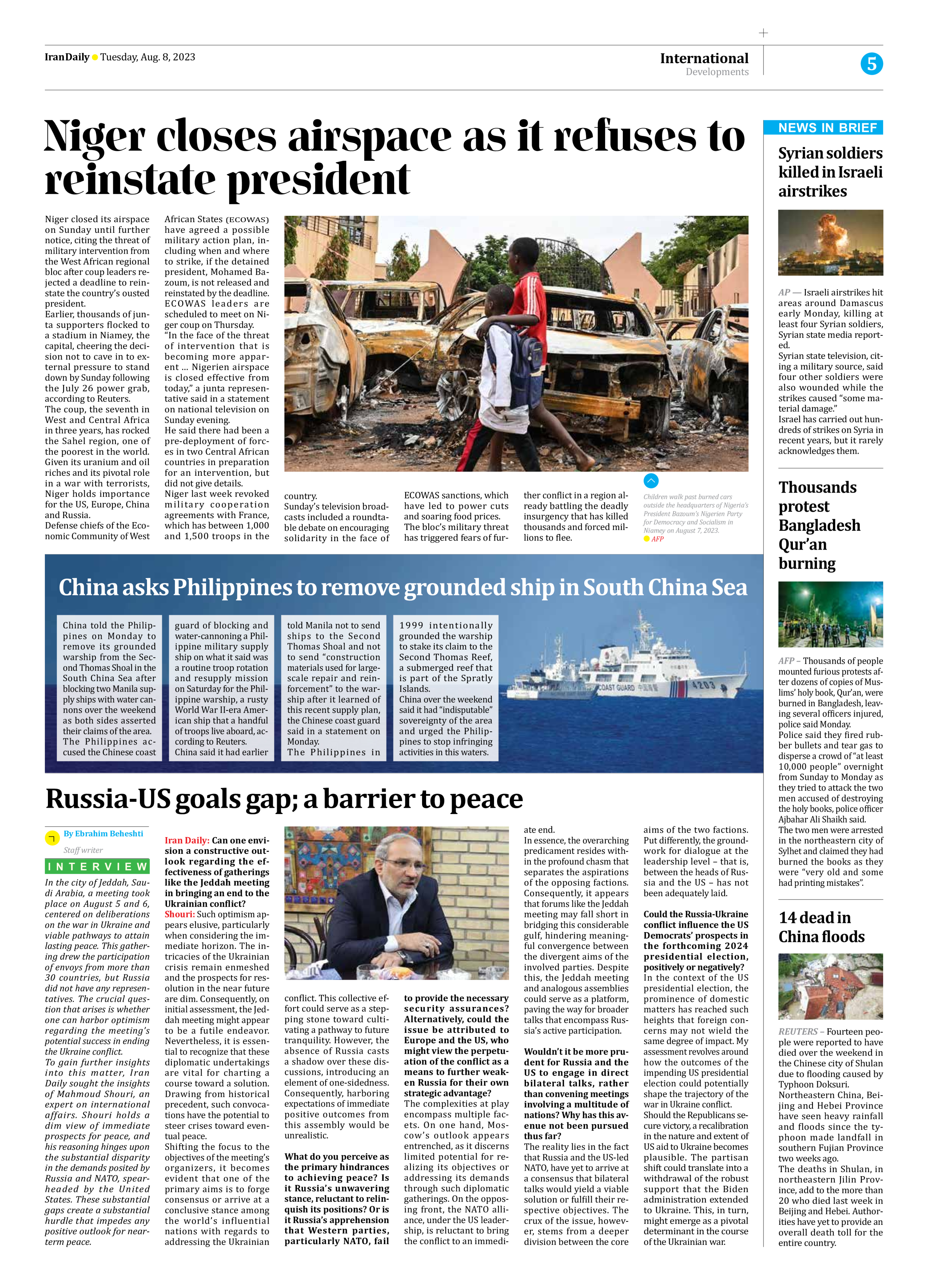
Russia-US goals gap; a barrier to peace
By Ebrahim Beheshti
Staff writer
In the city of Jeddah, Saudi Arabia, a meeting took place on August 5 and 6, centered on deliberations on the war in Ukraine and viable pathways to attain lasting peace. This gathering drew the participation of envoys from more than 30 countries, but Russia did not have any representatives. The crucial question that arises is whether one can harbor optimism regarding the meeting’s potential success in ending the Ukraine conflict.
To gain further insights into this matter, Iran Daily sought the insights of Mahmoud Shouri, an expert on international affairs. Shouri holds a dim view of immediate prospects for peace, and his reasoning hinges upon the substantial disparity in the demands posited by Russia and NATO, spearheaded by the United States. These substantial gaps create a substantial hurdle that impedes any positive outlook for near-term peace.
Iran Daily: Can one envision a constructive outlook regarding the effectiveness of gatherings like the Jeddah meeting in bringing an end to the Ukrainian conflict?
Shouri: Such optimism appears elusive, particularly when considering the immediate horizon. The intricacies of the Ukrainian crisis remain enmeshed and the prospects for resolution in the near future are dim. Consequently, on initial assessment, the Jeddah meeting might appear to be a futile endeavor. Nevertheless, it is essential to recognize that these diplomatic undertakings are vital for charting a course toward a solution. Drawing from historical precedent, such convocations have the potential to steer crises toward eventual peace.
Shifting the focus to the objectives of the meeting’s organizers, it becomes evident that one of the primary aims is to forge consensus or arrive at a conclusive stance among the world’s influential nations with regards to addressing the Ukrainian conflict. This collective effort could serve as a stepping stone toward cultivating a pathway to future tranquility. However, the absence of Russia casts a shadow over these discussions, introducing an element of one-sidedness. Consequently, harboring expectations of immediate positive outcomes from this assembly would be unrealistic.
What do you perceive as the primary hindrances to achieving peace? Is it Russia’s unwavering stance, reluctant to relinquish its positions? Or is it Russia’s apprehension that Western parties, particularly NATO, fail to provide the necessary security assurances? Alternatively, could the issue be attributed to Europe and the US, who might view the perpetuation of the conflict as a means to further weaken Russia for their own strategic advantage?
The complexities at play encompass multiple facets. On one hand, Moscow’s outlook appears entrenched, as it discerns limited potential for realizing its objectives or addressing its demands through such diplomatic gatherings. On the opposing front, the NATO alliance, under the US leadership, is reluctant to bring the conflict to an immediate end.
In essence, the overarching predicament resides within the profound chasm that separates the aspirations of the opposing factions. Consequently, it appears that forums like the Jeddah meeting may fall short in bridging this considerable gulf, hindering meaningful convergence between the divergent aims of the involved parties. Despite this, the Jeddah meeting and analogous assemblies could serve as a platform, paving the way for broader talks that encompass Russia’s active participation.
Wouldn’t it be more prudent for Russia and the US to engage in direct bilateral talks, rather than convening meetings involving a multitude of nations? Why has this avenue not been pursued thus far?
The reality lies in the fact that Russia and the US-led NATO, have yet to arrive at a consensus that bilateral talks would yield a viable solution or fulfill their respective objectives. The crux of the issue, however, stems from a deeper division between the core aims of the two factions. Put differently, the groundwork for dialogue at the leadership level – that is, between the heads of Russia and the US – has not been adequately laid.
Could the Russia-Ukraine conflict influence the US Democrats’ prospects in the forthcoming 2024 presidential election, positively or negatively?
In the context of the US presidential election, the prominence of domestic matters has reached such heights that foreign concerns may not wield the same degree of impact. My assessment revolves around how the outcomes of the impending US presidential election could potentially shape the trajectory of the war in Ukraine conflict.
Should the Republicans secure victory, a recalibration in the nature and extent of US aid to Ukraine becomes plausible. The partisan shift could translate into a withdrawal of the robust support that the Biden administration extended to Ukraine. This, in turn, might emerge as a pivotal determinant in the course of the Ukrainian war.







